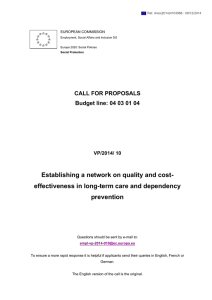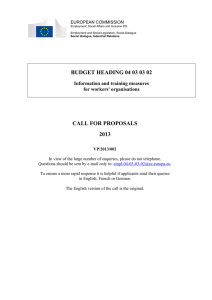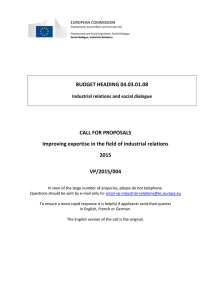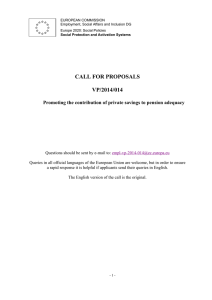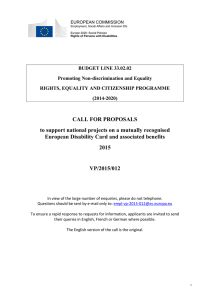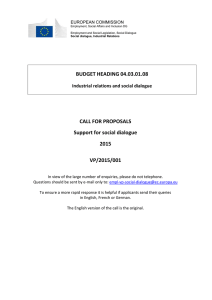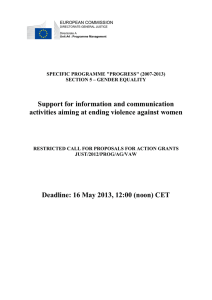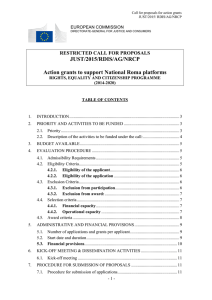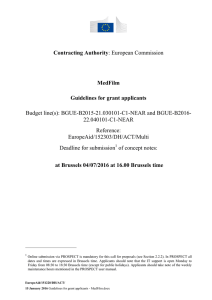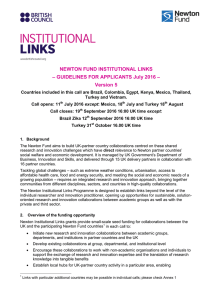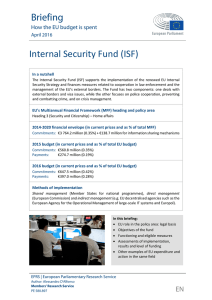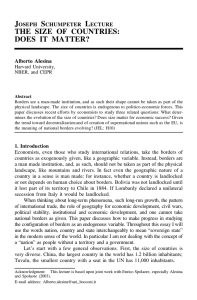INTERNAL SECURITY FUND BORDERS AND VISA (2014
Anuncio
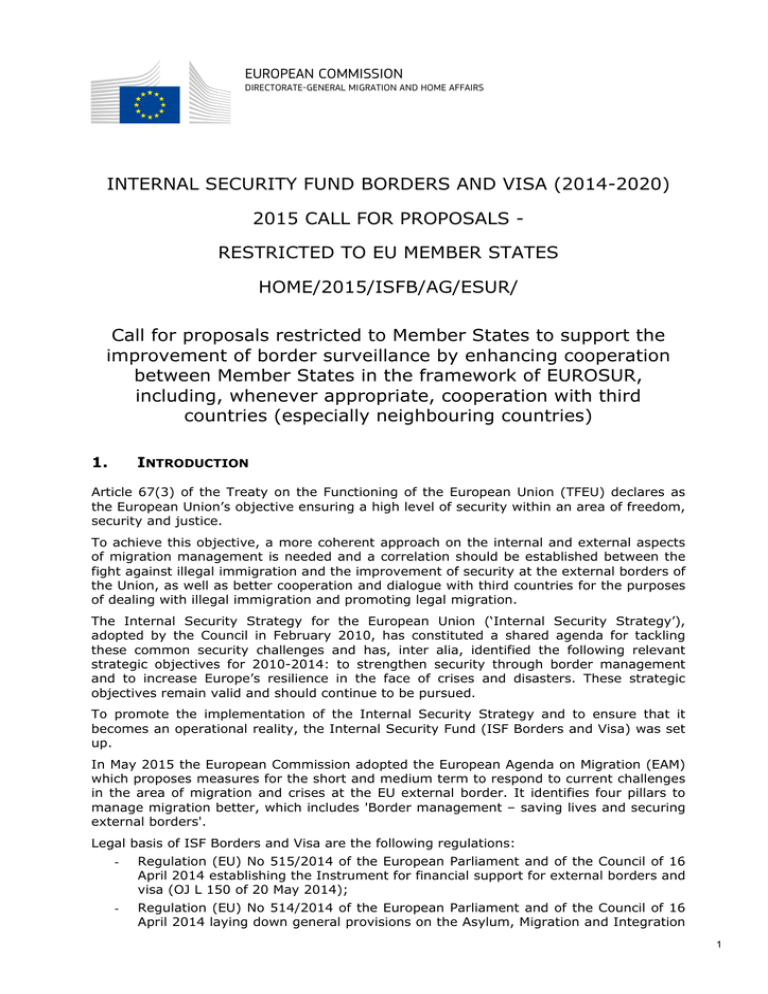
EUROPEAN COMMISSION DIRECTORATE-GENERAL MIGRATION AND HOME AFFAIRS INTERNAL SECURITY FUND BORDERS AND VISA (2014-2020) 2015 CALL FOR PROPOSALS RESTRICTED TO EU MEMBER STATES HOME/2015/ISFB/AG/ESUR/ Call for proposals restricted to Member States to support the improvement of border surveillance by enhancing cooperation between Member States in the framework of EUROSUR, including, whenever appropriate, cooperation with third countries (especially neighbouring countries) 1. INTRODUCTION Article 67(3) of the Treaty on the Functioning of the European Union (TFEU) declares as the European Union’s objective ensuring a high level of security within an area of freedom, security and justice. To achieve this objective, a more coherent approach on the internal and external aspects of migration management is needed and a correlation should be established between the fight against illegal immigration and the improvement of security at the external borders of the Union, as well as better cooperation and dialogue with third countries for the purposes of dealing with illegal immigration and promoting legal migration. The Internal Security Strategy for the European Union (‘Internal Security Strategy’), adopted by the Council in February 2010, has constituted a shared agenda for tackling these common security challenges and has, inter alia, identified the following relevant strategic objectives for 2010-2014: to strengthen security through border management and to increase Europe’s resilience in the face of crises and disasters. These strategic objectives remain valid and should continue to be pursued. To promote the implementation of the Internal Security Strategy and to ensure that it becomes an operational reality, the Internal Security Fund (ISF Borders and Visa) was set up. In May 2015 the European Commission adopted the European Agenda on Migration (EAM) which proposes measures for the short and medium term to respond to current challenges in the area of migration and crises at the EU external border. It identifies four pillars to manage migration better, which includes 'Border management – saving lives and securing external borders'. Legal basis of ISF Borders and Visa are the following regulations: - Regulation (EU) No 515/2014 of the European Parliament and of the Council of 16 April 2014 establishing the Instrument for financial support for external borders and visa (OJ L 150 of 20 May 2014); - Regulation (EU) No 514/2014 of the European Parliament and of the Council of 16 April 2014 laying down general provisions on the Asylum, Migration and Integration 1 Fund and on the instrument for financial support for police cooperation, preventing and combating crime, and crisis management (OJ L 150 of 20 May 2014). The ISF Borders and Visa Regulation sets out two specific objectives, respectively: (i) supporting a common visa policy to facilitate legitimate travel, provide a high quality of service to visa applicants, ensure equal treatment of third-country nationals and tackle illegal immigration; (ii) supporting integrated border management, including promoting further harmonisation of border management-related measures in accordance with common Union standards and through the sharing of information between Member States and between Member States and the Frontex Agency, to ensure, on one hand, a uniform and high level of control and protection of the external borders, including by the tackling of illegal immigration and, on the other hand, the smooth crossing of the external borders in conformity with the Schengen acquis, while guaranteeing access to international protection for those needing it, in accordance with the obligations contracted by the Member States in the field of human rights, including the principle of non-refoulement. In conformity with Regulation (EU) No 514/2014 Article 6.2, in order to implement the ISF Borders and Visa, the Commission has adopted, on 26 May 2015, the 2015 Annual Work Programme for Union Actions, which includes this Call for Proposals.1 This call supports the implementation and further development of the European Border Surveillance System (EUROSUR), which became operational in December 2013.2 EUROSUR is a multi-purpose system used for preventing illegal immigration and cross-border crime at the external borders, thereby contributing to the further development of the Schengen acquis. It aims to contribute to protect and save the lives of migrants attempting to cross the external borders. To achieve these objectives, EUROSUR provides a common framework for information exchange and cooperation among all authorities with responsibility for the surveillance of the external land and sea borders. EUROSUR follows an intelligence and risk analysis driven approach, allowing national and European authorities to better understand what is happening at the external borders and enabling them to react faster to new routes and methods used for illegal immigration and cross-border crime. Key elements of this include near-real time information exchange, regular intelligence sharing and close cooperation among authorities at national and European level. 2. PRIORITIES OF THIS CALL FOR PROPOSALS The present Call for Proposals aims at funding projects on the topic of supporting the improvement of border surveillance by enhancing cooperation between Member States in the framework of EUROSUR, including, whenever appropriate, cooperation with third countries (especially neighbouring countries). Project applications submitted under the present Call for Proposals must address at least one of the following priorities: (1) Exchange of the situational pictures of neighbouring external border sections In line with paragraphs 9 and 10 of Article 9 of Regulation (EU) No 1052/2013 establishing EUROSUR, the project shall enable the national coordination centres of two or more 1 A substantial modification to the 2015 work programme for Union actions and emergency assistance was adopted by Commission Implementing Decision C(2015)6189 on 11 September 2015. A second substantial modification was adopted by Commission Implementing Decision C(2015)8/474 on 30 November 2015. 2 Regulation (EU) No 1052/2013 of 22.10.2013 establishing EUROSUR; Commission Recommendation C92015)9206 final of 15.12.2015 adopting the Practical Handbook for implementing and managing EUROSUR. 2 neighbouring Member States to share with each other, directly and in near-real-time, the situational picture of neighbouring external border sections, including a) incidents and other significant events contained in the events layer; b) tactical risk analysis reports as contained in the analysis layer; c) positions, status and type of own assets operating in the neighbouring external border sections as contained in the operational layer. While the project proposal needs to fully cover the requirements described in letters a) and b), the requirements described in letter c) are optional. Project proposals covering also letter c) will be given priority over projects covering only letters a) and b). (2) Support to Member States capacities to detect and track small vessels The project shall enable two or more Member States to improve their technical or operational capability to detect, track and intercept non-cooperative vessels in a common area of interest with a view to preventing irregular migration and cross-border crime, as well as to reducing the loss of migrants' lives at the external sea borders. Examples for improving the technical capability are • Combined use of at least two different sensors mounted on at least two different platforms (e.g. satellite, remotely piloted aircraft system, maritime patrol aircraft, aerostat, etc); • Combined use of surveillance and communication capabilities (e.g. use of satellite communication for video streaming from the maritime patrol aircraft to the coordination centre); • Technical upgrade of existing radar stations (e.g. passive radar) on condition that the radar picture is shared with at least one other neighbouring Member State. Examples for improving the operational capability are • Integrated situational awareness, communication and coordination support tool for use at tactical/operational level, interlinking off shore patrol assets and coordination centres of two or more Member States, allowing them to exchange information, communicate and coordinate in real-time (e.g. positioning incidents and of assets, chat, video streaming). (3) Cooperation with neighbouring third countries The project shall support the cooperation between two or more Member States with a neighbouring third country with a view to preventing irregular migration and cross-border crime, as well as to reducing the loss of migrants' lives at the external borders. These activities may include actions related to • developing, establishing, upgrading and maintaining bi-or multilateral information exchange and cooperation; • regional networks; • equipment for centres in neighbouring third countries which are similar to the EUROSUR national coordination centres in Member States, • joint operations, including patrolling and surveillance activities; • training, studies, pilot projects. Any actions under this Call for Proposals shall respect and shall be implemented in line with the rights and principles enshrined in the Charter of Fundamental Rights of the European Union. Applications should pay appropriate attention to the effects of the project on individual rights and freedoms, as well as to possible remedies. In addition, any action under this Call for Proposals should comply with all relevant ethical principles and all applicable international, EU and national law on ethical issues while carrying out the project. 3 3. TIMETABLE Stages Date and time or indicative period a) Publication of the call 8 June 2016 b) Deadline for submitting applications c) Evaluation period d) Information to applicants e) Signature of Grant Agreement November 2016 f) Starting date of the action November 2016 4. BUDGET AVAILABLE 22 July 2016 – 12:00 CET July – September 2016 October 2016 The total budget earmarked for the co-financing of projects is estimated at EUR 2 million. The Commission reserves the right not to distribute all the funds available. 5. ADMISSIBILITY REQUIREMENTS Applications must be sent no later than the deadline for submitting applications referred to in section 3. Applications must be submitted in writing to the functional mailbox [email protected] using the Application Form provided (including all parts of the Application Package)(see section 12). Applications must be drafted in one of the EU official languages. English is preferred in order to speed up the evaluation procedure. Projects cannot be scheduled to last more than 24 months.3 Applications for projects scheduled to run for a longer period will be rejected. Failure to comply with these requirements will lead to the rejection of the application. 6. ELIGIBILITY CRITERIA 6.1. Eligible applicants and applications In order to be eligible for a grant, the Applicant and the Co-applicants must be: a) legal persons; applications from natural persons are not eligible; b) a public body; c) established in a Member State participating in the ISF Borders and Visa instrument4. Supporting documents: In order to assess the Applicants' eligibility, a Declaration of Honour, which must be printed out, signed by the authorised signatory and included (as a scanned document) in the Application Package, must be provided by the Applicant (Annex 1) and each Co-applicant (Annex 2). Other supporting documents may be requested at a later stage. 3 4 The project duration may be extended during its implementation for duly justified reasons subject to the Commission's approval via an amendment to the Grant Agreement. All EU Member States, with the exception of United Kingdom and Ireland, as well as the Schengen Associated Countries, are participating in the ISF Borders and Visa instrument. Legal entities established in the United Kingdom (unless the United Kingdom decides to opt in and to participate in the ISF Borders and Visa) or Ireland cannot participate in this call. 4 6.2. Eligible activities The following types of activities are eligible under this Call for Proposals: 7. • to improve the knowledge and understanding of the situation prevailing in the Member States and third countries through the analysis, evaluation and close monitoring of policies; • to support the development of statistical tools, including common statistical tools, methods and common indicators; • to support and monitor the implementation of Union law and Union policy objectives in the Member States, and assess their effectiveness and impact, including with regard to respect for human rights and fundamental freedoms, as far as the scope of the Instrument is concerned; • to promote networking, mutual learning, identification and dissemination of best practices and innovative approaches amongst different stakeholders at European level; • to promote projects aiming at harmonisation and interoperability of border management-related measures in accordance with common Union standards with a view to developing an integrated European border management system; • to enhance awareness of Union policies and objectives among stakeholders and the general public, including corporate communication on the political priorities of the Union; • to boost the capacity of European networks to assess, promote, support and further develop Union policies and objectives; • to support particularly innovative projects developing new methods and/or technologies with a potential for transferability to other Member States, especially projects which aim to test and validate research projects; • to support actions in relation to and in third countries. EXCLUSION CRITERIA Applicants will be excluded from participating in the Call for Proposals procedure and from the grant award if they are in any of the situations referred to in articles 131(4) of the EU Financial Regulation5, i.e. one of the following situations: 7.1. Exclusion from participation in the Call for Proposals (a) they are bankrupt or being wound up, are having their affairs administered by the courts, have entered into an arrangement with creditors, have suspended business activities, are the subject of proceedings concerning those matters, or are in any analogous situation arising from a similar procedure provided for in national legislation or regulations; (b) they or persons having powers of representation, decision making or control over them have been convicted of an offence concerning their professional conduct by a judgment of a competent authority of a Member State which has the force of res judicata; (c) they have been guilty of grave professional misconduct proven by any means which the contracting authority can justify including by decisions of the EIB and international organisations; 5 Regulation (EU, EURATOM) No 966/2012 of the European Parliament and of the Council of 25 October 2012 on the financial rules applicable to the general budget of the Union (OJ 2012 L298, p. 1). 5 (d) they are not in compliance with their obligations relating to the payment of social security contributions or the payment of taxes in accordance with the legal provisions of the country in which they are established or with those of Belgium or those of the country where the action is to be implemented; (e) they or persons having powers of representation, decision making or control over them have been the subject of a judgment which has the force of res judicata for fraud, corruption, involvement in a criminal organisation, money laundering or any other illegal activity, where such an illegal activity is detrimental to the Union's financial interests; (f) they are currently subject to an administrative penalty for: being guilty of misrepresentation in supplying the information required by the Commission as a condition of participation in a procurement or grant award procedure or for failing to supply this information; or having been declared to be in serious breach of its obligations under grant agreements or contracts financed by the Union's budget. 7.2. Exclusion from award Applicants will not be granted financial assistance if, in the course of the grant award procedure, they: (a) are subject to a conflict of interest in connection with the action; (b) are guilty of misrepresentation in supplying the information required by the Commission as a condition of participation in the grant award procedure or fail to supply this information; (c) find themselves in one of the situations of exclusion, referred to in section 7.1. Administrative and financial penalties may be imposed on Applicants and Co-applicants who are guilty of misrepresentation. Supporting documents: In order to evaluate Applicants against exclusion criteria, a Declaration of Honour must be provided by the Applicant (Annex 1) and each Co-applicant (Annex 2) certifying that they are not in one of the situations described above. Annex 1 and Annex 2 must be printed out, signed by the relevant authorised signatory and included (as a scanned document) in the Application Package. 8. SELECTION CRITERIA 8.1. Financial capacity Applicants must have stable and sufficient sources of funding to maintain their activity throughout the period during which the action is being carried out and to participate in its funding. However, the financial capacity assessment is not applicable to public bodies. Therefore they do not need to submit any supporting documents for financial capacity. 8.2. Operational capacity Applicants must have the professional competencies as well as appropriate qualifications necessary to complete the proposed action. This capacity shall be assessed based on the experience of the Applicants and each Co-applicant or, as an alternative, on the relevant experience of their directly involved employees. However, the operational capacity assessment is not applicable to public bodies. Therefore they do not need to submit any supporting documents for operational capacity. 9. AWARD CRITERIA Eligible applications and their proposed action will be assessed on the basis of the following award criteria: 6 - Relevance: applications will be assessed on the extent to which they match the priorities as identified in this Call for Proposals (section 2 above) and in the relevant EU strategic documents and/or action plans (section 1 above), and on whether the expected impact will be significant on the selected priority(ies) (30 points) - Quality: applications will be assessed with regards to the appropriateness of their design and planned implementation, taking into account the envisaged activities, methodology, organisation of work and strategy for project management, evaluation and dissemination (20 points) - Cost-effectiveness: applications will be assessed with regards to whether the costs of the proposed action are adequate to the activities and proportionate to the expected results (30 points) - European added value: the project activities, outcomes and impact should have a broad EU relevance; applications will be assessed on whether a suitable number of countries is involved in the project activities and on whether the expected impact will concern a significant number of countries (20 points). Applications that pass the threshold of minimum 65 points will be considered for funding within the limits of the available budget. The European Commission will then prepare an award decision listing the projects proposed for award, projects on reserve list and rejected projects. 10. LEGAL COMMITMENTS A Commission award decision does not represent a legal or financial commitment. The award of each grant is subject to the conclusion of a Grant Agreement in writing. In the event a grant is awarded by the Commission, a Grant Agreement, drawn up in euro and detailing the conditions and level of funding, will be sent to the Coordinator, as well as instructions on how to formalise the obligations of the parties. Please note that the award of a grant does not establish any entitlement for subsequent years. 11. FINANCIAL PROVISIONS 11.1. General Principles a) Non-cumulative award An action may only receive one grant from the EU budget. In no circumstances shall the same costs be financed twice by the Union budget. To ensure this, applicants shall indicate the sources and amounts of Union funding received or applied for the same action or part of the action or for its functioning during the same financial year as well as any other funding received or applied for the same action (Application Form, section 2.1 and 2.2). b) Non-retroactivity No grant may be awarded retrospectively for actions already completed. A grant may be awarded for an action which has already begun only where the Applicant can demonstrate the need to start the action before the Grant Agreement is signed. In any case, costs eligible for financing may not have been incurred prior to the date of submission of the grant application. c) Co-financing Co-financing means that the resources which are necessary to carry out the action may not be entirely provided by the EU grant. Co-financing of the action may take the form of: 7 d) - the Beneficiary's own resources, - income generated by the action, - financial contributions from third parties. Balanced budget The Budget Estimate of the action is to be attached to the Application Form. It must have revenue and expenditure in balance and must be drawn up in euro. Beneficiaries with general accounts in a currency other than the euro shall convert costs incurred in another currency into euro at the average of the daily exchange rates published in the C series of Official Journal of the European Union, determined over the corresponding reporting period.6 Where no daily euro exchange rate is published in the Official Journal of the European Union for the currency in question, conversion shall be made at the average of the monthly accounting rates established by the Commission and published on its website (http://ec.europa.eu/budget/contracts_grants/info_contracts/inforeuro/inforeuro_en.cfm), determined over the corresponding reporting period. Beneficiaries with general accounts in euro shall convert costs incurred in another currency into euro according to their usual accounting practices. Where the implementation of the action requires the award of procurement contracts (implementation contracts), the Beneficiary must award the contract to the bid offering best value for money or the lowest price (as appropriate), avoiding conflicts of interests and retain the documentation for the event of an audit. Detailed information on subcontracting is provided in the Guide for Applicants. e) Financial support to third parties The applications may not envisage provision of financial support to third parties. f) Eligibility of the full cost of equipment When equipment is the main output or one of the main outputs of the action, the full cost (100%) of the purchase may be accepted as eligible cost, provided the beneficiary undertakes to use the purchased equipment for the intended purpose for a period of at least 5 years after the end of the project implementation (3 years in the case of IT equipment) and the equipment to be purchased at 100% rate is clearly identified in the Description of the Action and in the Budget Estimate. g) Non-profit rule EU grants may not have the purpose or effect of producing a profit within the framework of the action. Profit shall be defined as a surplus of the receipts over the eligible costs incurred by the Beneficiary, when the request is made for payment of the balance. In this respect, where a profit is made, the Commission shall be entitled to recover the percentage of the profit corresponding to the Union contribution to the eligible costs actually incurred by the Beneficiary to carry out the action. 11.2. Maximum amount requested The EU grant is limited to a maximum co-funding rate of 95% of the total eligible costs of the action. Consequently, part of the total eligible expenses entered in the Budget Estimate must be financed from sources other than the EU grant (see section 11.1.c). The Commission reserves the right to reduce the estimated costs in the Budget Estimate, if they are deemed as ineligible. 6 For further guidance on exchange rate please consult the Guide for Applicants. 8 11.3. Payment arrangements A pre-financing payment corresponding to maximum 80% of the EU grant amount will be transferred to the Coordinator after the signature of the Grant Agreement by both parties and in accordance with its terms. The Commission will establish the amount of the final payment to be made to the Coordinator on the basis of the calculation of the final grant amount. If the total of earlier payments is higher than the final grant amount, the Beneficiaries will be required to reimburse the amount paid in excess by the Commission through a recovery order. 12. PROCEDURE FOR THE SUBMISSION OF APPLICATIONS Applications must be submitted electronically to the functional mailbox [email protected] in accordance with the formal requirements set out under section 5 and by the deadline set out under section 3, after which the Commission will not accept any application. No modification to the application is allowed once the deadline for submission has elapsed. However, if there is a need to clarify certain aspects or for the correction of clerical mistakes, the Commission may contact the Applicant during the evaluation process. Failure to respond by the deadline set may lead to rejection of the application. Applicants must take the necessary steps to ensure that they can respond rapidly until the end of the selection process. Applications that are not submitted to the above email address or within the deadline shall not be considered for evaluation. Applications must be submitted using the forms and templates provided. If the forms or templates are altered, the application may be rejected. Applications for several projects The Applicant may submit more than one application under this Call for Proposals. Note that if an Applicant wants to submit more than one application under the same Call for Proposals, a different Application Form must be used for each application. The Applicant may be awarded more than one grant under this Call for Proposals. An organisation may participate as an Applicant or Co-applicant in several applications. Several applications for the same project Only one application will be accepted and evaluated for any given project. If the Applicant submits more than one version of the Application Package or of documents contained therein under the same application, only the latest version submitted will be taken into consideration for the evaluation. In case there are several applications for the same project, the Applicant (contact person mentioned in the application) will be asked to clarify which application shall be evaluated. The Application Package to be submitted Please read carefully the Guide for Applicants for details and explanations concerning the compulsory documents to be submitted as a complete Application Package. Each Application Package must include ALL the following compulsory documents: Application Package Application Form Description of the Action 9 Budget Estimate Annexes 1-8 ANNEXES Annex 1 Annex 2 Description Declaration of Honour Partnership Declaration Annex 3* Letter of support To be provided by Applicant Each Co-applicant Entity that wishes to support the project without being Applicant or Co-applicant, i.e. it cannot incur costs Annex 6* Financial Capacity Form (Excel) Balance sheet and profit and loss account or business plan List of projects or CVs Annex 7* Audit report Not applicable for public bodies Annex 8 Checklist Applicant on behalf of himself and all the Co-applicants Annex 4* Annex 5* Not applicable for public bodies Not applicable for public bodies Not applicable for public bodies * if applicable All the templates of the Application Package will be sent to all the eligible applicants (i.e. public bodies established in a Member State participating in the ISF Borders and Visa instrument), together with the Guide for Applicants. Applicants are advised to consult the Call for Proposals webpage regularly during the period leading up to the submission deadline in case announcements, updates or frequently asked questions are published. Applicants will be informed in writing about the results of the selection process. Contacts Questions may be sent by e-mail to: [email protected] indicating clearly the reference of the Call for Proposals. Question submitted later than 7 days before the submission deadline, i.e. after 15 July 2016 will not be considered and thus not answered. The Commission shall reply according to the code of good administrative behaviour within 15 working days from the receipt of the question. In the interest of equal treatment of applicants, the Commission cannot give a prior opinion on the eligibility of Applicants or actions or on the outcome of the Call for Proposals before the official announcement of results. 13. PUBLICITY 13.1. By the Beneficiaries Beneficiaries must clearly acknowledge the European Union’s contribution in all publications or in conjunction with activities for which the grant is used. Please refer to the Grant Agreement for more details. 13.2. By the Commission All information relating to grants awarded in the course of a financial year shall be published on an internet site of the European Union institutions no later than the 30 June of the year following the financial year in which the grants were awarded. The Commission will publish the following information: - name and address of the beneficiary, - subject of the grant, 10 - amount awarded. Upon a reasoned and duly substantiated request by the Beneficiary, the publication shall be waived if such disclosure risks threatening the rights and freedoms of individuals concerned as protected by the Charter of Fundamental Rights of the European Union or harm the commercial interests of the beneficiaries. 14. DATA PROTECTION The reply to any Call for Proposals involves the recording and processing of personal data (such as name, address and CV). Such data will be processed pursuant to Regulation (EC) No 45/2001 on the protection of individuals with regard to the processing of personal data by the Community institutions and bodies and on the free movement of such data. Unless indicated otherwise, the questions and any personal data requested are required to evaluate the application in accordance with the specifications of the Call for Proposal and will be processed solely for that purpose by the department responsible for the EU programme concerned. Details concerning the processing of personal data are available on the privacy statement at: http://ec.europa.eu/dataprotectionofficer/privacystatement_publicprocurement_en.pdf Personal data may be registered in the Early Warning System (EWS) only or both in the EWS and Central Exclusion Database (CED) by the Accounting Officer of the Commission, should the beneficiary be in one of the situations mentioned in: - the Commission Decision 2008/969 of 16.12.2008 on the Early Warning System (for more information see the Privacy Statement on: http://ec.europa.eu/budget/contracts_grants/info_contracts/legal_entities/legal_entiti es_en.cfm ), - the Commission Regulation 2008/1302 of 17.12.2008 on the Central Exclusion Database (for more information see the Privacy Statement on: http://ec.europa.eu/budget/explained/management/protecting/protect_en.cfm ). or 15. MEANS OF REDRESS If, at any stage of the administrative treatment of grant applications, the persons or entities concerned consider that they have been affected by an instance of maladministration, they may, irrespective of any other means of redress, make a complaint to the European Ombudsman in accordance with Article 228(1) of the Treaty on the Functioning of the European Union and as provided by the Parliament Decision of 9 March 1994 on the regulations and general conditions governing the performance of the Ombudsman's duties published in Official Journal L 113 of 4 May 1994. 11
